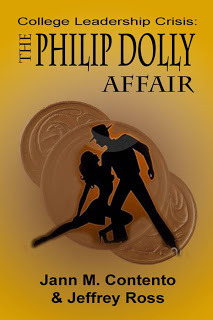The Philip Dolly Affair

CollegeLeadership Crisis: The Philip Dolly Affair
By JannM. Contento & Jeffrey Ross (Rogue Phoenix Press, 2011)
An interview with the authors, Jann Contento and Jeffrey Ross
What made you wantto write about college life? Jeff: Wehave always been intrigued by community college work life and the Campus Novel genre.We were aware very little community college fiction exists. We have writtenseveral academic articles about certain "challenging" community college issues.At some point, we decided that fiction, comic fiction, might be a better way toarticulate our "contrarian" views about the community college experience.

How much researchdo you do? Jeff: Jann did an extensive amount of research onthe middle section—which deals with Argentine political intrigue of the 1960's.He really wanted to get our novel's "shadow world" done correctly—and it showsin the finished product.
What was the mostinteresting thing you discovered when you were doing your research? Jann: The mid-20th century academic,political, and Cold War ideologies dramatically reinforced the obviousintellectual contrast observed in current American community college culture.Research efforts also exposed a variety of themes which conveniently addedconversational dynamics to our characters.
What's yourfavorite method for researching? Jann: Ienjoy history, especially exploring primary source documents and biographies.My research methods include both traditional (library visitation, archivalsource analysis) as well as accessing digital internet source documents.However, I experience great satisfaction paging through aged paper copy, wheredusty fragrances of reborn images offer timeless words with freshinterpretations.
When do youwrite/what is your writing day like?
 Jeff: I need to write in the middle of distractions—when I have other thingsto do—during a busy day. I am heavily influenced by process pedagogies—Ibelieve in numerous drafts over numerous days. I don't like white noise, music,TV, or human discussions in the background when I am writing—day or night. Jann: I prefer writing in a relative state ofpeace and quiet, usually in the morning. Often, ideas, themes or qualitativedescriptors bounce around in my head throughout the later part of day andevening. Daily image chaos seems to work out best in a restful state.
Jeff: I need to write in the middle of distractions—when I have other thingsto do—during a busy day. I am heavily influenced by process pedagogies—Ibelieve in numerous drafts over numerous days. I don't like white noise, music,TV, or human discussions in the background when I am writing—day or night. Jann: I prefer writing in a relative state ofpeace and quiet, usually in the morning. Often, ideas, themes or qualitativedescriptors bounce around in my head throughout the later part of day andevening. Daily image chaos seems to work out best in a restful state.What is the bestadvice someone has given you about writing? Jeff: Probably the best advice I received(indirectly from my Virginia Woolf Seminar professor, Dr. E. H., years ago] was to view writing [fictionwriting and poetry] as art—not craft. I am not interested in writing in clearlyformulaic modes (mysteries—romance— vampires—wizards--- sciencefiction—westerns, for example). So much of that has been done—and donewell—that I cannot meaningfully contribute to the corpus. But "experimental" campus novels? Well, I amquite comfortable in this style. And Ibelieve fervently that satire is an art form.
Jann: I have toagree with Jeff in viewing fiction writing as art rather than craft. I havereceived plenty of advice from good intended sources, however misguided. MyAmerican Literature professor often reminded her students of the gloriousinequality of talent and the necessity of intellectual exercise—bestdemonstrated through writing. I readily revisit her holy guidance.
How do you developyour characters? Jeff: I rely onstereotyped notions used purposefully. You, gentle reader, may assign negativeconnotations to the use of stereotypes—I don't. You have all had teachers,professors, and bosses that fit certain "types." I work heavily at providingdetail-rich descriptions of such entities—and I think you will clearlyrecognize people you "know" in the Phil Dolly Affair.
Jann: Iattempt to create recognizable, yet illusive character types whose purpose isoften disguised by ambition. Sketches are developed in aggregate initially;then, as situational events arise, characters are further dissected tosubstantiate their appearance.
Who are yourfavorite authors? Have any authors inspired you or influenced your work? Jeff: My favorite authors fit into certaingroups, I suppose. I am quite fond of 19th century AmericanTranscendentalists [and Poe], of late 19th- early 20thcentury writers such as Hugo, Frank Norris, Hardy, Proust, Woolf, and Joyce, of19th century British Romantics, and quite a few 20thcentury American writers such as Zane Gray, Edward Abbey, Thomas Pynchon, LouisL'Amour, William Faulkner, and especially writers of the Southern Gothic likeFlannery O'Connor.
My list of favorite poets is legion—in noparticular order—Wallace Stevens, Shelley, Wordsworth, Donne [latter dayDonne], Roethke, AR Ammons—just not the masses of MFA project-generated poemsof the last 20 years!
What makes a greatbook in your opinion? Jeff: One that contributes, one that helps make theUniversal Puzzle more clear, one that almost always requires a hermeneuticcircle for meaningful analysis. I'm not really interested in books just forentertainment—even the great western writer Zane Grey was working on constructsof social democracy, primitivism, and the Power of the West in healingcivilization's corruptive effects.
Jann: Lasting message. A great bookoffers and narratively presents worthwhile questions by artistically presentingimages and positioning reader reactions and participation beyondintention.
If a reader tookaway one thing from your book(s), what would you like that to be? Jeff: Thateven the typical daily community college experience can be elevated into "art."
Jann: Hopefully a gregarious laugh and alasting lesson beyond the staged community college stetting.
Do you have anytips for aspiring authors? Jeff: ThomasHardy wanted to be a poet first—and a novelist second. I suppose that is mydream, too. And I might recommend that aspiring authors should try to work outtheir ideas in poetry, first.
 Jann: One should consider a conscious disciplined approach,foster courage, and regularly express respectful skepticism.
Jann: One should consider a conscious disciplined approach,foster courage, and regularly express respectful skepticism. Where do you seeyourself as an author in five years? Jeff: I suppose I would hope my fictionwriting helps me become a better poet. I would like to be able to smoothlyarticulate my ideas through poetry within the next five years. Jann: I hope Iam provided an opportunity to critically examine social/behavioral eventsthrough fiction. I would also like to improve personal habits which assist progressin poetic writing.
Where do you seethe publishing industry going in the next few years and where do you seeyourself within this industry? Jeff: Hard to say. Technology has empowered themasses to produce text [which is probably a good thing]. I'm afraid I may getlost in the shuffle. Or ignored. Remember when Jack Nicholas was shouting "Youcan't handle the truth!"? [I think it was in A Few Good Men.] I'm afraidwe may be offering a kind of truth in PDA the happy masses won'tacknowledge.
Jann: I hope youngreaders will more fully embrace literature and help progress diverse offeringswithin the rapidly changing publishing industry.
Brief BioJann M. Contento has a broad range ofexperiences in higher education including student affairs administration,athletics, and institutional research. He is currently working in a communitycollege setting and has co-authored several articles on leadership and collegeculture.
Jeffrey Ross is an Op Ed writer, rockabilly musician, and former full-timecommunity college teacher. He has had four "Views" pieces publishedon InsidehigherEd.com since 2007, has authored and co-authored several op-edarticles on community college identity, purpose, and culture, and has recentlyhad several pieces published on the Cronk News higher education satirewebsite.
Online Presence and Social Media Links Face book Info Page http://www.facebook.com/pages/College-Leadership-Crisis-The-Philip-Dolly-Affair/109780632466832?sk=info Getting to Know Phil Dolly Bloghttp://copperfieldcommunitycollege.blogspot.com/
Twitter Account @SalinasChickhttps://twitter.com/#!/salinaschick Jeffrey Ross Creative Efforts Home Page on Web Eden (Music and More)http://jeffreyross.webeden.co.uk/ Jeffrey Ross Open Salon Blog—other poetry and essays http://open.salon.com/blog/slipdoc/popularity
The Philip Dolly AffairWhile community colleges arecurrently receiving heightened attention, this novel provides abehind-the-scenes analysis of many whispered truths, those simmering butunspoken workplace behaviors, issues, and machinations every worker (Everyman!)will recognize. A humorous and biting read with a clever mix of satire,political intrigue, failed romances, and tragic-comedy, this novel will openyour eyes to the truth about community colleges …
An Excerpt-
Emmie Seemy, EdD, Chair,Communications
Dr. Emmie Seemy seemed likeable enough. At 64,she could have retired several years ago. But the job, Reading Professor ANDChair of Communications, gave her substance and meaning. Her days at CCC werepleasant--her faculty seniority afforded her a bit of eccentricity that wasaccepted by both her younger colleagues and senior administrators.
Dr. Seemy's signature motto at the bottom of heremails read
Never Quit! Never Yield!Never Give Up!
She didn't really trust anyone, though, and keptan eye on all correspondence, meeting minutes, and the activities and behaviorsof everyone around her.
Dr. Seemy was quite a character, that's for sure.She wore [very large] black framed glasses with sequin designs embedded throughoutthe thick frame and ear pieces. She dyed her hair jet black and kept it in a60's era beehive. Dr. Seemy typically wore old-fashioned rhinestone cocktaildresses [even short ones that showed her age-knobby knees].
Her clothes always smelled like smoke andperfume-- that hot, rich, blanketing Las Vegas smoke and Shanelle Number 5perfume odor permeating gambling houses and strip hotels in the 70's…..
She drives a Lincoln--an old 83 Lincoln still interrific shape [except for dog hairs on the back seat].
Dr. Seemy used to have two great big dogs, large,spit-drooling Dobermans she would bring to school with her. They would loungein her office and were quite the topics of discussion around campus--the dogswere loved and hated, admired and feared. Students generally liked the greatbeasts, but then, Castor, one of the pooches, bit a student named Gerald Ladmo.The college settled for an undisclosed amount out of court. She had to boardthe dogs after that, instead of bringing them to CCC.
Dr. Seemy had smoked for decades--and quit onlyafter it came down from the hill that smoking was no longer legal. Shehad smoked Virginia Slims through a long, black sequined cigarette holder--whengrasping the cigarette holder, and leaning forward in her chair, she had theaura of a 30's or 40's Hollywood actress--poised, debonair, and strangelydistant.
Give-Away
The authors will begiving away a novel-companion e-form [PDF] "chapbook" of poetry "voiced" by oneof the novel's characters, panish Professor Jack Frost, to one randomly drawn commenter. Follow the tour and leave your comments; the more you comment, the better yourchances of winning! The tour dates can be found here: http://goddessfishpromotions.blogspot.com/2011/12/virtual-book-tour-philip-dolly-affair.html
Be sure to follow the tour and leave a comment to win!
Fiction Writing and Other Oddities
Published on March 08, 2012 06:21
No comments have been added yet.



